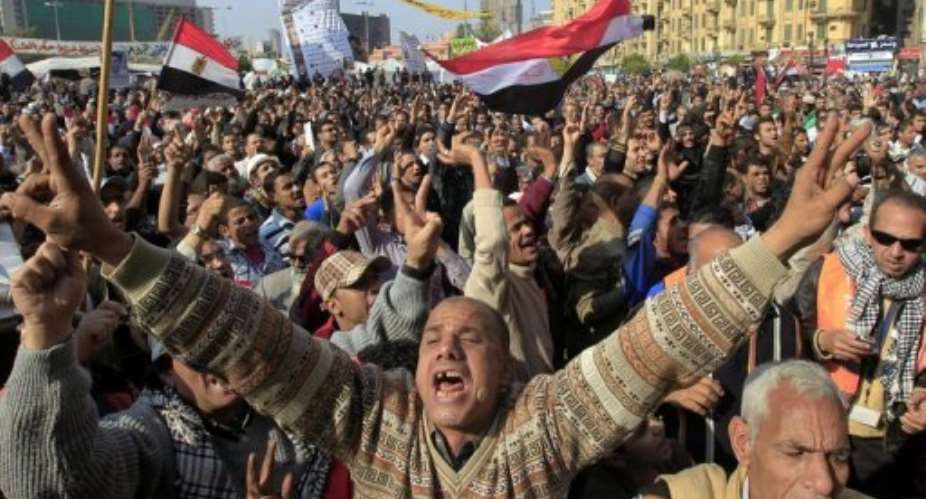CAIRO (AFP) - Egypt awaited Friday the delayed publication of results for the opening phase of its first post-revolution election, with the projected rise of hardline Islamists causing unease among secular liberals.
The date for results has been pushed back twice from their initially scheduled time of Wednesday evening, with the delay blamed on high turnout estimated at above 70 percent in the Monday-Tuesday vote.
Two demonstrations were also called on Friday -- one against the army leaders overseeing the country's promised transition to democracy and another to support the regime -- but turnout was low by recent standards.
Millions of Egyptians embraced their new democratic freedoms this week in Cairo and second-city Alexandria in the first election since the toppling of the 30-year rule of president Hosni Mubarak in February.
The results at 1800 GMT were expected to show the Muslim Brotherhood, a moderate Islamist movement banned for decades under Mubarak, as the dominant force.
The group's Freedom and Justice Party (FJP) "will probably reach around 40 percent when all the votes are counted," said Salah Abdel Raouf, a spokesman for the Muslim Brotherhood in east Cairo.
Hardline Islamists who follow the strict Salafi brand of Islam are expected to have beaten secular liberals for second place and could emerge with as much as 20 percent of the vote, according to local media projections.
The results are for only the first part of a parliamentary election taking place in three stages, but the results will reveal the political trends that will shape a country that has not had a free vote in 60 years.
Only a third of constituencies voted this week in the election for a new lower house of parliament. The rest of the country will follow on December 14 and then on January 3.
The prospect of an Islamist-dominated parliament raises fears among liberals about civil liberties, religious freedom in a country with the Middle East's largest Christian minority, and tolerance of multi-party democracy.
"My father is seriously thinking about sending me and my brothers elsewhere because he thinks we won't have a future in the country with the Salafis," Nardine, a Christian banker in her 20s, told AFP.
A leading Salafi candidate to be the next president, Hazem Abu Ismail, aired his hardline views on society and religion in a television interview on Thursday evening.
Asked if he would allow his son to marry an unveiled woman, he replied: "I would tell him not to marry her... All Muslim women want to be veiled, but those who are not simply haven't had the strength."
Leaders from the Muslim Brotherhood, set to be the main party in parliament, have repeatedly stressed their commitment to multi-party democracy and inclusiveness, and have pledged to ensure freedoms.
The Brotherhood's FJP says it strives for a "civil state, defined as a non-military non-religious state... that respects human rights" according to its political programme.
The group has been officially banned since the 1950s, but it counts hundreds of thousands of members and is known for its vast network of social and religious outreach programmes, as well as its stand against corruption.
The Brotherhood and other political parties are expected to face a fierce power struggle with the army to ensure the complete transfer of power to the new civilian leaders.
The FJP has already said it expects to be asked to form a new government to replace a new military-appointed administration set to be announced on Saturday.
The army leaders last week named a new caretaker prime minister, 78-year-old Mubarak-era politician Kamal al-Ganzuri, who is to unveil his cabinet at the weekend, according to state television.
Last week, 43 people were killed and more than 3,000 injured in violent protests against the interim military regime which is accused of looking to consolidate its huge political and economic power.
Analysts say Egypt, the Arab world's most populous nation and its cultural heart, faces a long, highly complex and uncertain transition to democracy amid growing growing concerns about the economy.
A SCAF official said on Friday that foreign reserves were dwindling and were only enough to cover imports for the next three months. The ruling military has agreed to lend $1.0 billion to the central bank, a military official said.





 Lay KPMG audit report on SML-GRA contract before Parliament – Isaac Adongo tells...
Lay KPMG audit report on SML-GRA contract before Parliament – Isaac Adongo tells...
 Supervisor remanded for stabbing businessman with broken bottle and screwdriver
Supervisor remanded for stabbing businessman with broken bottle and screwdriver
 NDC watching EC and NPP closely on Returning Officer recruitment — Omane Boamah
NDC watching EC and NPP closely on Returning Officer recruitment — Omane Boamah
 Your decision to contest for president again is pathetic – Annoh-Dompreh blasts ...
Your decision to contest for president again is pathetic – Annoh-Dompreh blasts ...
 Election 2024: Security agencies ready to keep peace and secure the country — IG...
Election 2024: Security agencies ready to keep peace and secure the country — IG...
 People no longer place value in public basic schools; new uniforms, painting wil...
People no longer place value in public basic schools; new uniforms, painting wil...
 'Comedian' Paul Adom Otchere needs help – Sulemana Braimah
'Comedian' Paul Adom Otchere needs help – Sulemana Braimah
 Ejisu by-election: Only 33% of voters can be swayed by inducement — Global InfoA...
Ejisu by-election: Only 33% of voters can be swayed by inducement — Global InfoA...
 Minority will expose the beneficial owners of SML, recover funds paid to company...
Minority will expose the beneficial owners of SML, recover funds paid to company...
 Prof. Opoku-Agyemang has ‘decapitated’ the NPP’s strategies; don’t take them ser...
Prof. Opoku-Agyemang has ‘decapitated’ the NPP’s strategies; don’t take them ser...
